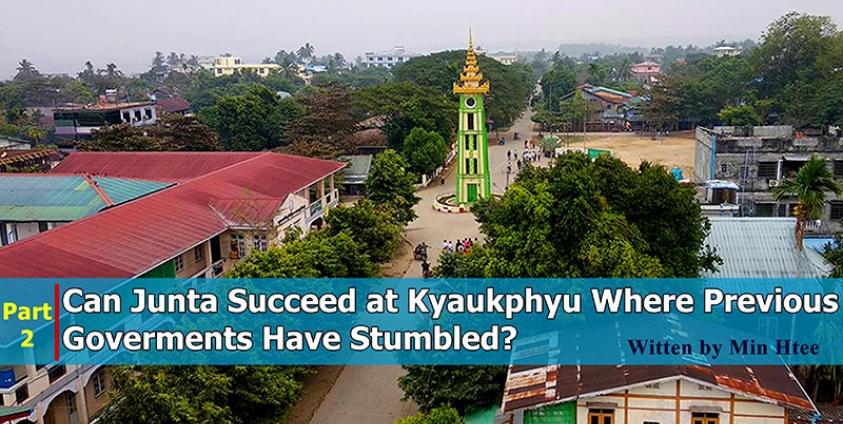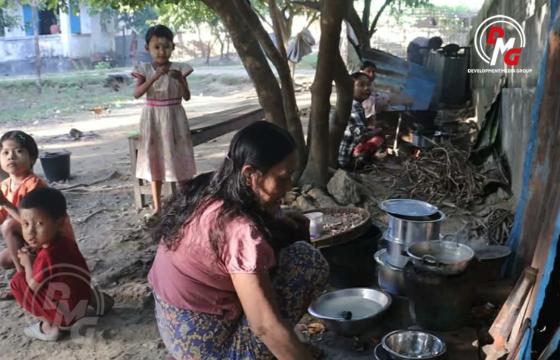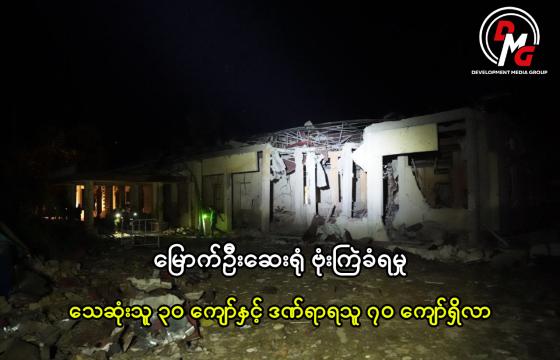The Kyaukphyu Special Economic Zone (SEZ) project is an amalgam of many interests. It is geopolitically sensitive and will help give rise to the political power of an already powerful China. The Kyaukphyu SEZ is a very important project for China’s dreams of world domination.
As previously explored, behind the Kyaukphyu SEZ are political, economic and military interests for China. The expansion of China’s presence in the Indian Ocean also threatens the interests of the world’s Western powers.
French President Emmanuel Macron announced in October 2018 that he would send an aircraft carrier to the Indian Ocean in 2019 “to defend freedom of navigation,” showing how important Kyaukphyu — China’s gateway to the Indian Ocean — is on the global political landscape.
China and Myanmar signed an agreement to develop the Kyaukphyu SEZ at an 85:15 ratio. In the Indian Ocean, some Western powers have military bases, while China has taken over Sri Lanka’s deep-sea port on a 99-year lease.
For China, which has only one military base outside the country, the Kyaukphyu SEZ is a critically important “overseas” project, and Myanmar is more important to China because of the Kyaukphyu SEZ. That is why the since-deposed National League for Democracy (NLD) government conducted a years-long review of the Kyaukphyu project, which was signed and approved by U Thein Sein’s administration, and increased Myanmar’s stake in the project from 15% to 30%. Neither the NLD government nor the Tatmadaw (Myanmar military) seemed to want the Arakan Army (AA) to settle in Arakan State after 2015.
As China has implemented its Belt and Road Initiative (BRI), President Xi Jinping shifted his foreign relations policy to a more inclusive one, as well as a government-to-government, military-to-military and civilian-to-civilian approach. According to this model, China will have to take seriously the Arakan Army, which has grown exponentially in Arakan State in two years and has the full support of the Arakanese people. As a result, the government declared the Arakan Army a terrorist organization, and within two years, the Tatmadaw launched offensives that killed more than 300 civilians, and more than 200 were prosecuted for alleged ties to the ethnic armed group. In addition, the government imposed years of internet restrictions in Arakan State prior to and during the COVID-19 pandemic.
Despite a nationwide ceasefire and two years of fighting in Arakan State alone, the Tatmadaw and the government have failed to eradicate the AA and the AA has risen to prominence significantly. Despite an informal ceasefire between the military and the AA in November 2020 — before the military seized power — the lack of significant political dialogue in Arakan State for eight months suggests that the chairman of the State Administration Council does not like the presence of the Arakan Army in Arakan State.
China has repeatedly defended the Myanmar military, which has been facing popular uprisings since its February 1 coup, at UN meetings. The chairman of the State Administration Council has set up the BRI Implementation Committee to reconstitute the Kyaukphyu deep-sea port after the United States rejected a UN resolution condemning Israel over the Gaza Strip.
It marks a new step for the chairman of the military council to approach powerful China and overcome a crisis. The junta has not yet been recognized by any country as a legitimate government in the four-plus months since the military coup. The chairman of the State Administration Council has approached diplomacy in order to gain the support of China, which has repeatedly called on ASEAN to mediate in post-coup Myanmar’s affairs.
But China cannot be underestimated. The current chairman of the State Administration Council, who took over as Commander-in-Chief of the Defence Services in 2011 and chose Vietnam as his first foreign trip, has shown that he wants to remake relations with China, which were established by his predecessors. As Vietnam is an enemy of China, it is certain that China paid close attention to this act.
China’s interest in Arakan State is evident in its involving itself in mediation on the return of Muslims who fled the 2016 and 2017 upheaval in northern Arakan State.
Considering the Kyaukphyu project, China will no doubt be more interested in the situation in Arakan State than in Myanmar’s military coup. Therefore, even if the Kyaukphyu deep-sea port project is currently underway, it can avoid any interference from the AA. The AA will only be able to carry out its mission of building and spreading its influence in Arakan State and will continue to follow the path (Way of Rakhita) it has announced.
I think the most important thing here is the role of the Arakanese political parties. It is not known whether Arakanese political leaders were unaware of Kyaukphyu’s significance or kept it a secret, but it is surprising that in the future global political landscape, Myanmar has not been discussed as more important because of Arakan State. I have seen some Arakanese political leaders discuss the Kyaukphyu deep-sea port and special economic zone projects from a jobs perspective, but this is a “small picture” way of thinking. Kyaukphyu, which is full of its interests, will be China’s most important military and political anchor point in the Indian Ocean.
The NLD government signed off on a number of projects across the China-Myanmar Economic Corridor (CMEC) to expand nationwide, considering the benefits of the Kyaukphyu project. To start this project, Myanmar must first endeavor to ensure peace and stability. China has the power to do its own thing whether the country is stable or not. Attempting to engage China in the current instability in Myanmar may provide protection for the military council, but politically it will only lead to conflict and poverty.
Another consideration is that in terms of readiness, Myanmar still needs a lot of infrastructures to start this project. Stability needs to be established, and instability is not a good way to develop. However, China’s policy is based on the theme “Development is Stable”. In the Horn of Africa, where China’s only military base is located, countries such as Djibouti will always have unequal imports and exports. China and Djibouti had a bilateral trade value of US$49.83 million in 2002, with Djibouti exporting only US$20,000 to China.
As Myanmar embarks on development, such as the Kyaukphyu project, it could lead to more harm than good, such as an accumulation of debt that could lead to a situation, not unlike Sri Lanka’s deep-sea port.







